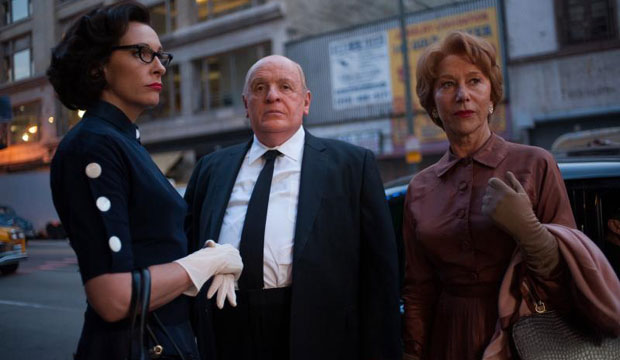
Fox Searchlight Pictures
98 min., dir. by Sacha Gervasi, with Anthony Hopkins, Helen Mirren, and Toni Collette
His films have never and will never go away, but 2012 will go down in history as the year Alfred Hitchcock’s life returned to the spotlight. With HBO premiering its original film The Girl, which documents the torturous gauntlet through which Hitch ran burgeoning actress Tippi Hedren, Sacha Gervasi’s Hitchcock takes a warmer look at the infamous filmmaker, while not shying away from his darker side. However, more than anything, Hitchcock examines the fact that Alfred was nothing without his wife and close-knit circle of collaborators.
Riding the success of his recent hit, North by Northwest, Alfred Hitchcock sets out to find the inspiration for his next film. Owing one more film to Paramount, the studio encourages Hitch to churn out another spy-themed picture, pushing books like Ian Flemming’s Casino Royale into the director’s view. Hitchcock wants nothing of it though — he wants to do something different. Eying Robert Bloch’s Psycho — a novel about the infamous murderer Ed Gein — Hitch fights tooth and nail to make Psycho his next project.
Seen by the studio and everyone who “matters” as a pile of tasteless trash, Hitchcock strikes a deal with Paramount in hopes of getting the film seen. If Hitchcock can raise the money to shoot the film on his own, Paramount will distribute the piece, and they don’t even have to pay Hitchcock his traditional director’s fee. Torn by the constant questions of his choice of material and his insecurities in his personal life, Pyscho seems like the film that will do Hitchcock in.
Obviously it doesn’t, but for those who thought Hitchcock was always seen as the infallible genius with studios throwing money at him for any project he wanted to helm, you’re in for a surprise. At the time, many of his now-classic films were widely panned, and even though he was a sought after auteur, no one was willing to risk a dime on a film they felt to be unworthy of Hitch’s time and effort. Drumming up all the publicity himself, working on a fully closed set, and refusing to conform to everything everyone wanted him to be, Pyscho was one of the biggest gambles in film history. Having the knowledge that Pyscho turned out to be one of history’s most important films, starting a whole new genre, takes a bit away from the film’s lasting appeal when it comes to dealing with the trials and tribulations of its production.
The title Hitchcock is slightly misleading. Alfred Hitchcock is the man known as the master of suspense, the guy who filmed scenes from under a coffee table and put the first toilet on a film screen — but the title Hitchcock really refers to not just the man, but the amazing support team that made him who he was. Little is publicly known about his wife Alma Reville, but when Hitchcock ends, you’ll start to question whether Alfred Hitchcock would have been as well-known as he is if not for Alma. From story lines to editing decisions, it was Alma’s words and suggestions that formed Hitch’s final decisions. She was a rock of a woman who stood up to the overbearing presences and neurotic mind of this prolific filmmaker. There are others who helped prop up the master in his darkest times, and they get their due, but this is a film about a man and the wife who made him a better person.
There was a fear that the film would try too hard to mimic Hitchcock’s work and bury any true feelings under a cavalcade of nostalgic recreations. Gervasi nails a beautiful balance between the playful Hitchcock flavor and the purely original discovery of the film’s script. Almost melding together his own concoction that spans all of Hitchcock’s stylish genres, the film reaches some chilling high points when Hitch dreams of conversing with Ed Gein himself, exploring the levels of darkness in all of us. There’s enough interest to be pulled from Hopkins’ performance and the other portrayals of some very well-known actors and actresses, but it’s the directorial aspect of Hitchcock that wins in the end.
If your desire is to sit and watch Anthony Hopkins drawl out his Hitchcock impression while getting a sneak peak at how Pyscho came to be, you’ll get all of that. Don’t be afraid though to pick and pry at the rest Hitchcock has to offer, as it’s just as rich and deep as one of the great director’s films.
—
Matthew Schuchman is the founder and film critic of Movie Reviews From Gene Shalit’s Moustache and the contributing film writer for IPaintMyMind.